Top 10 Medical Billing Software
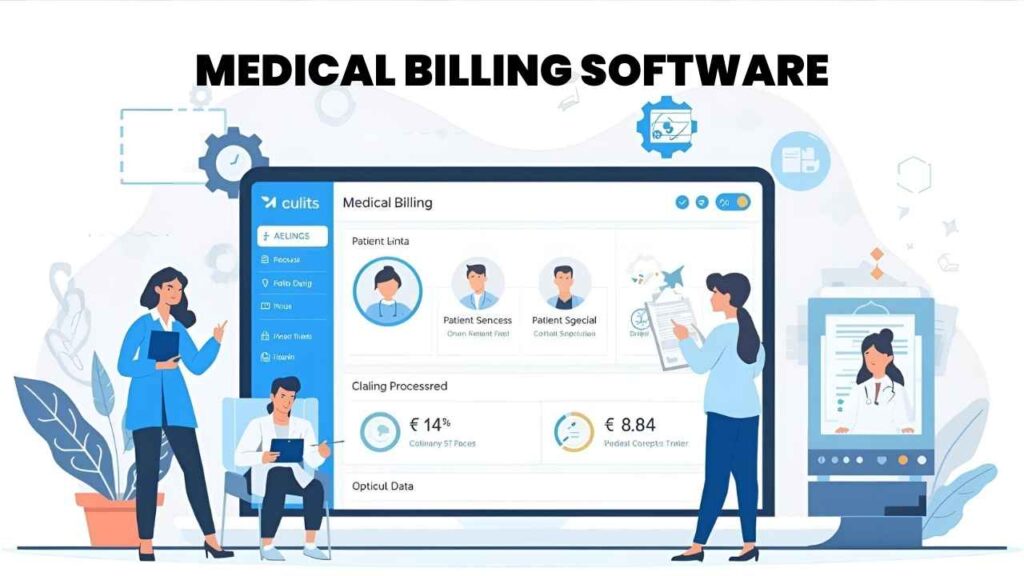
The need to improve the operations of healthcare providers by ensuring optimized revenue cycles, as well as having the correct records on their patients, and ensuring that regulations are observed, is putting much pressure on them today. Medical billing software became a significant part of the novel healthcare practices that embrace automation of complicated billing requirements and lighten the burden of administration.
Whether it is a small independent clinic or a huge network of hospitals, a properly selected medical billing software can greatly influence the efficiency of operations and financial outcomes. It provides an in-depth guide to the best solutions on the market in 2025 to empower healthcare professionals in making the right choices regarding their billing infrastructure.
What is Medical Billing?
Medical billing is the act of submitting a claim and chasing the payment of medical services offered to patients against health insurance companies. It is a complicated process, which includes translating the healthcare diagnosis, procedures, and health services into a standard code that can be processed and paid by the insurance service providers.
The processes that span the entire medical billing sequence, including initial patient registration and insurance verification, and right up to final payment collection and reporting, are largely automated by medical billing software.
However, with the introduction of technology in medical billing, the process of revenue management by healthcare providers has undergone a revolution, as anything related to errors, speed of payment processing, and the general financial performance of the medical practices go in improved.
Why Medical Billing Software is Important
The current trends in medical care involve the use of advanced technology in handling the dynamics of the modern medical billing and revenue management.
- Efficiency: Medical billing software streamlines routine tasks and saves a lot of time concerning manual entry and processing of data by the healthcare personnel.
- Accuracy: A large number of validations will minimize labor errors and rejected claims, which will increase the level of the first-pass claim rate accepted by insurance companies.
- Compliance: Built-in regulatory compliance ensures that practices can comply with all HIPAA, ICD-1, 0 regulations and other mandates regarding healthcare without the requirement to manually monitor every activity.
- Financial Visibility: Real-time reporting and analytics provides the whole picture of the performance of practices, outstanding claims, and revenue cycle performance.
- Integration: With support to workflows via systems integration with EHR systems and practice management platforms, a practice can easily remove data silos.
Limitations to Look for in Medical Billing Software
Selecting medical billing software, clinicians are advised to carefully examine the risks that can have an adverse impact on the efficiency of the work and financial side of their activities.
- Complexity: Interfaces that are too complicated will deter staff since; they will require more time to train, and will not perform better in their day-to-day activities.
- Rigid: Rigid software platforms tend not to accommodate customized workflow in practice or billing processes in specialized areas of medicine.
- Poor Integration: Integration with other programs or systems may be absent, such as with pre-existing EHR, or practice management systems, and this creates inefficiency within the workflow and data silos.
- Hidden Costs: The Hidden Costs cost which is a background of upgrading, maintaining, training, or premium features may have high cost of ownership.
- Not Good Customer Support: Divergence in the availability of customer support or providing poor customer support can lead to the helplessness of the practices in situations when there is extensive billing to do.
Comparison Table for Medical Billing Software
| Software Name | Rating | Best Feature |
| Athenahealth | 4.8/5 | Automated claim submissions |
| AdvancedMD | 4.7/5 | Multi-specialty customization |
| NextGen Healthcare | 4.6/5 | Comprehensive workflow integration |
| DrChrono | 4.5/5 | Mobile-first design |
| eClinicalWorks | 4.4/5 | Cloud-based accessibility |
| TruBridge | 4.3/5 | Outsourced billing services |
| Oracle | 4.2/5 | Enterprise-level integration |
| Tebra | 4.1/5 | User-friendly interface |
| Medisoft | 4.0/5 | Affordable pricing structure |
| Practice Fusion | 3.9/5 | Free EHR integration |
Top 10 Medical Billing Software
1. Athenahealth
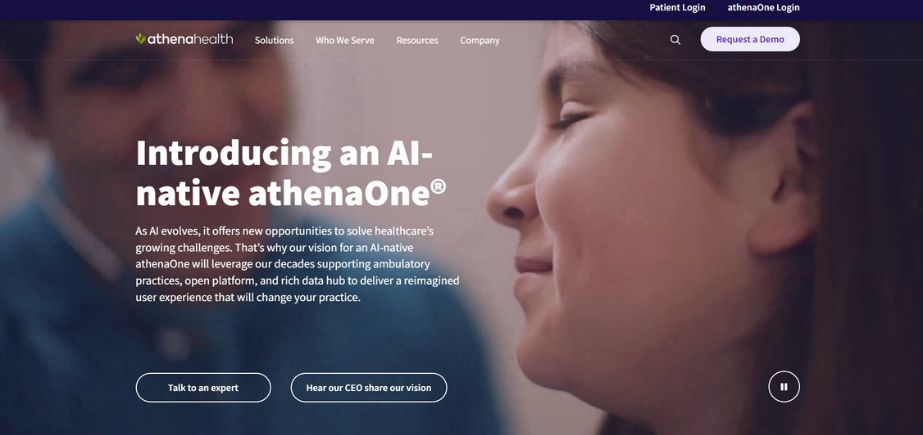
Rating: 4.8/5
Website: https://www.athenahealth.com/
Best Use Cases: Mid to large practices requiring automated workflows
Atenahealth is a market leader in billing medical software that is cloud-based and transforms the way healthcare practices handle their revenue cycles. The platform leads in automating billing activities and has stringent compliance with most of the healthcare regulatory policies. Coupled with its advanced claim management system, it has a very small number of denials that are a result of its proactive validation, as well as real-time insurance verification capabilities.
Integration with pharmacy management systems also improves the billing process associated with managing medications, which is of particular value to practices that manage a large number of prescriptions. Athenahealth has advanced reporting capabilities that allow practices to generate detailed financial analyses and draw insights to unlock value and monitor performance.
Key Features:
- Automated charge capture
- Insurance eligibility verification
- Real-time financial reporting
- Pharmacy software integration
- Compliance monitoring tools
Pros:
- High automation levels
- Excellent claim acceptance
- Comprehensive reporting features
Cons:
- Higher pricing structure
- Complex initial setup
- Limited customization options
Pricing: custom quotes
2. AdvancedMD
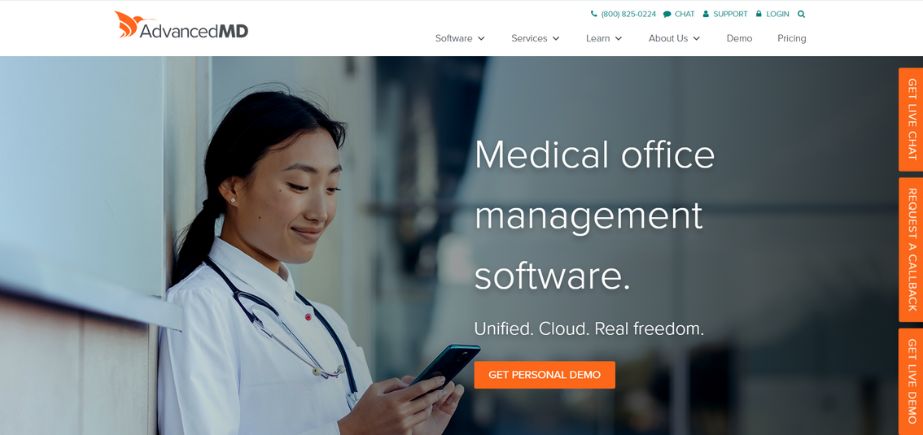
Rating: 4.7/5
Website: https://www.advancedmd.com/
Best Use Cases: Multi-specialty practices needing comprehensive practice management
AdvancedMD also offers a comprehensive practice management platform that seamlessly combines the features of powerful medical billing abilities with a wide-ranging set of healthcare management tools. The platform especially performs best in supporting multi-specialty practices by having highly customizable billing and coding capabilities that resonate with the different medical specialty needs.
It also has an automated claims management system with advanced denial follow-up technology that maximizes revenue recovery and minimizes administrative costs. The integration functionality of the software with pharmacy systems allows complete management of the prescription billing, making it invaluable to a practice that has large pharmaceutical needs. Detailed analytics and reports facilities built into AdvancedMD enable healthcare providers to gain actionable insights about their practice performance to understand how to optimize their revenue cycles to improve their operational efficiency.
Key Features:
- Customizable billing solutions
- Automated claims management
- Multi-specialty support
- Detailed analytics reporting
- EHR integration capabilities
Pros:
- Highly customizable platform
- Multi-specialty optimization
- Comprehensive feature set
Cons:
- Steep learning curve
- Requires extensive training
- Higher implementation costs
Pricing: Starts at $729 per provider per month
Suggested Blog: Best Task Management Software
3. NextGen Healthcare
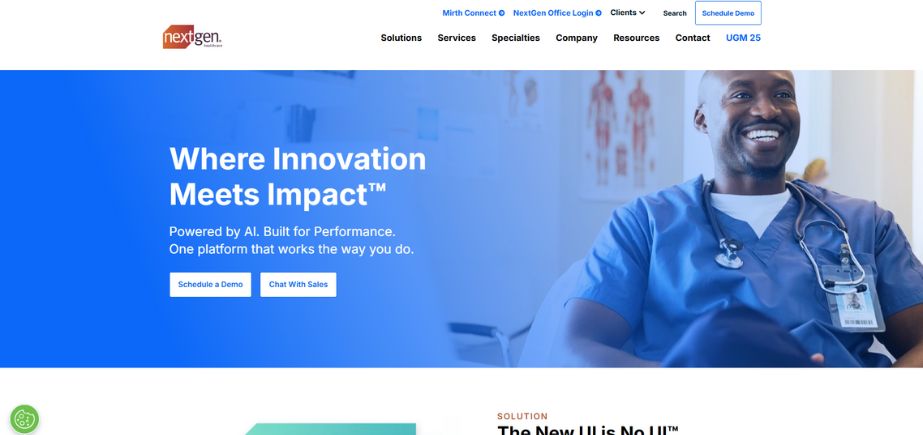
Rating: 4.6/5
Website: https://www.nextgen.com/
Best Use Cases: Large practices and healthcare systems requiring scalability
NextGen Healthcare offers an all-inclusive healthcare technology solution, which shows a combination of medical billing software with a high-performing and innovative EHR and practice management solution. The system also plays a key role in offering a scalable cloud-based system and advanced billing capabilities to large healthcare facilities. Connectivity with pharmacy software systems allows smooth payments and tracking of prescriptions within the scope of complex health care networks.
The personalized billing workflow and templates in the platform enable healthcare organizations to customize their processes to certain operational needs and still comply with regulations. The real-time claim tracking/denial management functionality of NextGen guarantees the best revenue cycle performance, whereas the developed reporting aspect offers a deep understanding of financial and operational key performance metrics that form the basis of strategic decision-making.
Key Features:
- Cloud-based billing tools
- Customizable workflow templates
- Real-time claim tracking
- Pharmacy system integration
- Advanced reporting analytics
Pros:
- Highly scalable solution
- Comprehensive integration options
- Advanced customization capabilities
Cons:
- Complex implementation process
- Requires significant training
- Higher total ownership costs
Pricing: Custom pricing
4. DrChrono
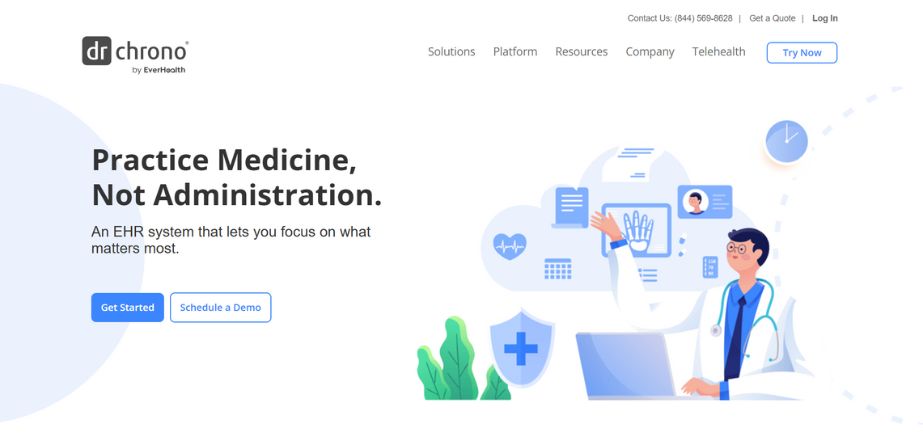
Rating: 4.5/5
Website: https://www.drchrono.com/
Best Use Cases: Mobile healthcare providers and small practices
DrChrono drives medical billing differently with its mobile-first design tailored to the needs of the medical industry, where medical providers need mobility and flexibility in their billing practices. Medical billing and EHR tools are effectively integrated on the platform, and the implementation prevents data silos and optimizes workflows. The software can be of particular use in those practices which have a high prescriptions-management through its provided pharmacy software interface facilities.
The billing and coding capabilities of DrChrono are automated to minimize manual data entry and maintain accuracy and compliance with the existing regulations in the sphere of healthcare sphere. The real-time reporting and analytics functionality of the platform offers a real-time view of practice performance and strategies for quick decision-making and revenue optimization.
Key Features:
- Mobile-optimized interface
- Automated billing processes
- Prescription management integration
- Real-time analytics
- EHR integration
Pros:
- Mobile accessibility
- User-friendly interface
- Integrated EHR functionality
Cons:
- Limited advanced features
- Smaller support network
- Basic reporting capabilities
Pricing: Starts at $199 per provider per month
5. eClinicalWorks
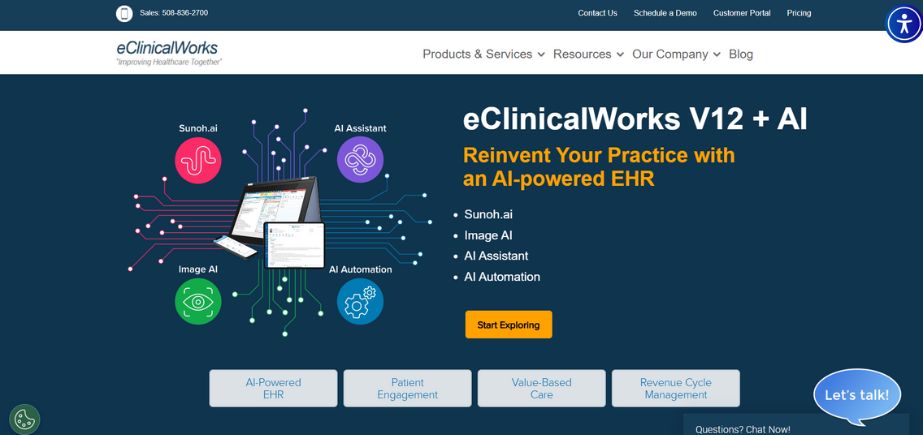
Rating: 4.4/5
Website: https://www.eclinicalworks.com/
Best Use Cases: Small to medium practices needing cloud accessibility
ClinicalWorks offers a comprehensive practice billing platform that is integrated with the EHR component and practice management system in order to streamline healthcare delivery processes in a synchronized manner. The cloud-based nature of the platform offers the potential of usability on multiple devices and open places, which renders the platform very convenient to administer with remote staff and in multi-location clinics and practices. The built-in required validation requirements as used by it in automatically tracking and filing claims is very useful in significantly reducing administration costs and increasing the claim approval percentages.
This integration at the pharmacy systems enables them to charge a medication, prescription management and eases multi-layered pharmaceutical billing functions. eClinicalWorks revenue cycle management software has a complete picture used to gain control over all billing functions starting with patient registration and ending with the collection of remittance and reconciliation.
Key Features:
- Cloud-based platform access
- Automated claim processing
- Mobile device compatibility
- Pharmacy system integration
- Revenue cycle management
Pros:
- Excellent cloud accessibility
- Comprehensive feature integration
- Mobile-friendly design
Cons:
- Occasional system slowdowns
- Limited customization options
- Basic reporting features
Pricing: Starts at $449 per provider per month
Also Read: Best Ecommerce Data Analytics Tools
6. TruBridge
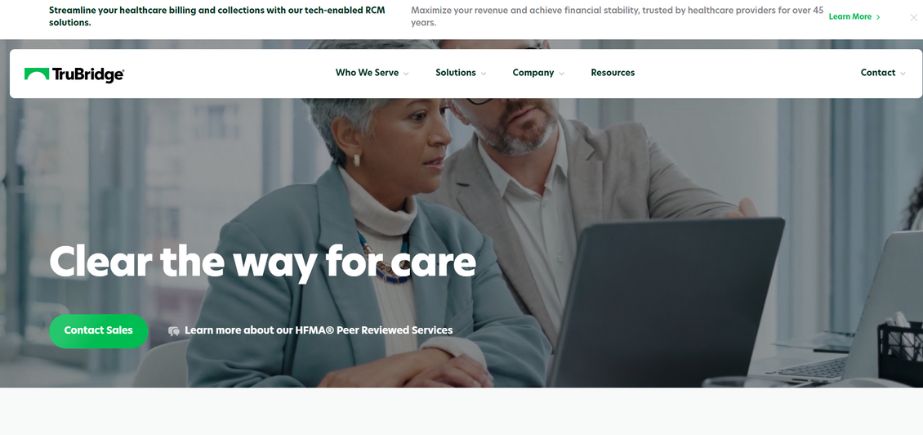
Rating: 4.3/5
Website: https://trubridge.com/
Best Use Cases: Practices preferring outsourced billing operations
TruBridge specializes in end-to-end medical billing services in the practices which are more likely to outsource break their billing processes to professionals. The end-to-end billing and coding services offered by the company do not require the company to employ any in-house billing department, as compliance with the existing healthcare regulations and billing standards is achieved. Their advanced denial management and appeal services generate maximum revenue recovery through specific follow-up procedures and insurance process expertise.
The integration features of TruBridge software with pharmacy software systems are worthwhile to any practice with a large pharmaceutical component of practice as the capabilities allow comprehensive medication-related billing to occur. The financial and performance reporting provided by the platform is detailed enough to afford sufficient visibility as to how the billing is conducted and the performance of the cycle of generating the revenue.
Key Features:
- Outsourced billing services
- Claim denial management
- Appeal processing services
- Pharmacy integration capabilities
- Performance reporting tools
Pros:
- Professional billing expertise
- Comprehensive outsourced services
- Expert denial management
Cons:
- Less direct control
- Higher long-term costs
- Limited in-house capabilities
Pricing: 3-8% of collected revenue
7. Oracle
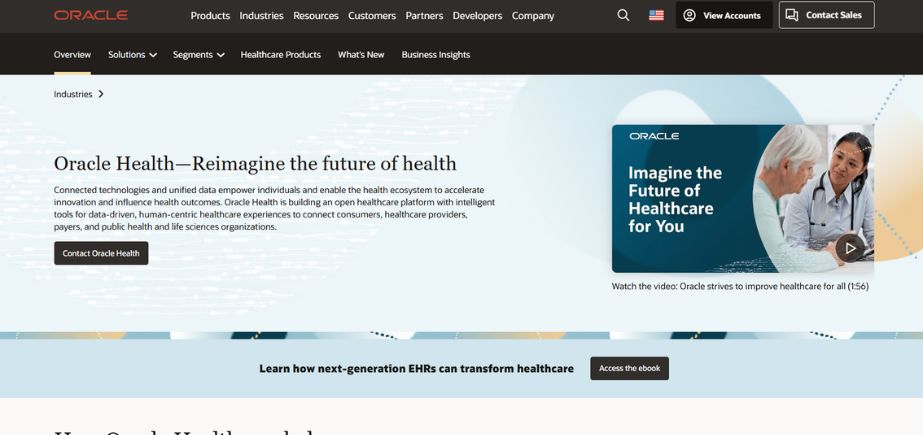
Rating: 4.2/5
Website: https://www.oracle.com/health/
Best Use Cases: Enterprise healthcare organizations requiring robust integration
The Oracle is an enterprise-level Platform that has a potential to be implemented in large-scale healthcare companies and hospital systems with a lot of integrating requirements. The system offers complete connectivity with hospital management systems and EHR, thus making the workflow within all aspects of healthcare operations smooth. The advanced features of its medical billing software simplify the complicated billing scenarios typical of large health care facilities by supporting multiple insurance levels and specialized coding of procedures.
The pharmacy functionalities allow proper regulation of the billing of the medications and maintaining records of prescriptions over a broad healthcare system because of the integration of its platform with pharmacy software systems. Oracle has powerful reporting and analytics software that gives a detailed view of the financial instruments, labor efficiency, and regulatory compliance indicators necessary in enterprise-level management of healthcare units.
Key Features:
- Enterprise-level integration capabilities
- Comprehensive billing tools
- Pharmacy system connectivity
- Advanced analytics reporting
- Hospital management integration
Pros:
- Robust enterprise features
- Comprehensive system integration
- Advanced reporting capabilities
Cons:
- High implementation costs
- Complex system requirements
- Extensive training needs
Pricing: custom pricing
8. Tebra
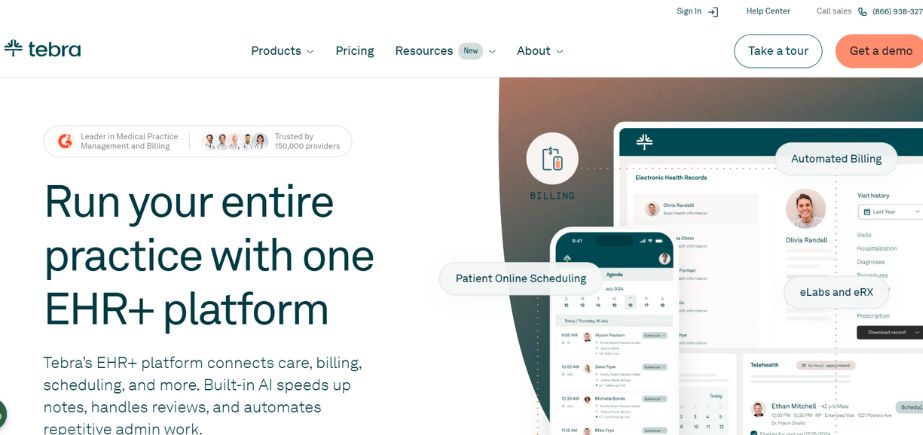
Rating: 4.1/5
Website: https://www.tebra.com/
Best Use Cases: Small healthcare practices needing simple solutions
Tebra offers a wide range of integrated cloud-based medical billing software designed with a smaller to medium-sized healthcare practice in mind, aimed at ensuring more efficient medical billing operations. The tool can be connected with EHR and practice management, resulting in a seamless experience with unified workflows and a removal of data silos and administrative overhead. Its automatic claim submissions, billing to patients reduces the time taken by hand especially in a scenario where the recovery is automated and the validation systems have made it more accurate.
Real-time claims tracking and denial management Tebra and denial management functionality offer optimal performance in terms of revenue cycle performance and minimal administrative burden. The availability of integrated pharmacy management functionality enables the platform to support the billing of medications, hence the platform is particularly useful to practices that have the sale of medications as part of their practice.
Key Features:
- Simple user interface
- Automated claim submissions
- Real-time tracking capabilities
- Integrated pharmacy management
- Patient billing automation
Pros:
- User-friendly design
- Excellent small practice fit
- Affordable pricing structure
Cons:
- Limited scalability options
- Basic reporting features
- Fewer advanced capabilities
Pricing: Starts at $80 per provider per month
9. Medisoft
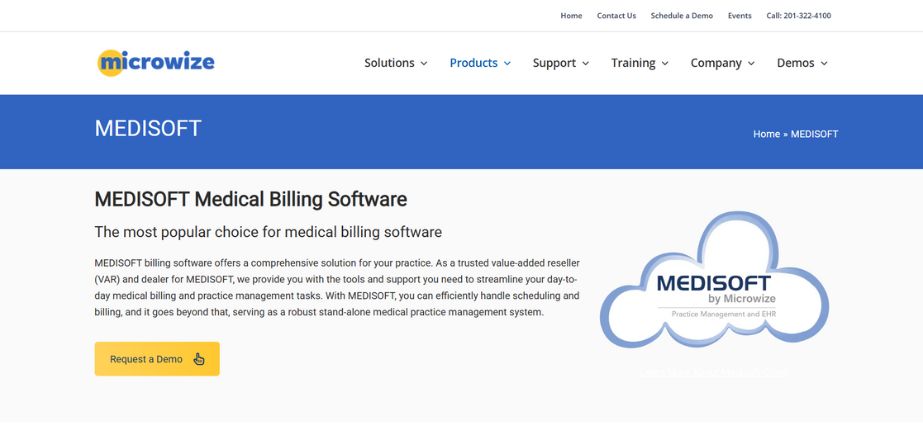
Rating: 4.0/5
Website: https://microwize.com/medisoft/
Best Use Cases: Small practices requiring affordable, established solutions
Medisoft has earned its place as a trusted medical billing software platform through years of demonstrated success providing high-quality service to small as well as mid-sized health practices. The billing program is powerful and cost-effective, with billing modules that contain basic but necessary practice management features that do not overcomplicate the software. Its proficient medical billing and coding software guarantees the successful submission and processing of claims, but also keeps them in compliance with the latest healthcare regulations.
The insurance claims management of Medisoft simplifies the complete claim cycle from claims submissions to payment collection and reconciliation. The integration features of the platform with the pharmacy software systems allow supporting the process of prescription-related billing management efficiently, so it can be used in practices that include pharmaceutical services.
Key Features:
- Medical billing tools
- Insurance claims management
- Pharmacy software integration
- Personalized billing templates
- Coding assistance features
Pros:
- Affordable pricing structure
- Established a reliable platform
- Comprehensive basic features
Cons:
- Outdated user interface
- Limited cloud capabilities
- Basic integration options
Pricing: Starts at $329 one-time purchase
10. Practice Fusion
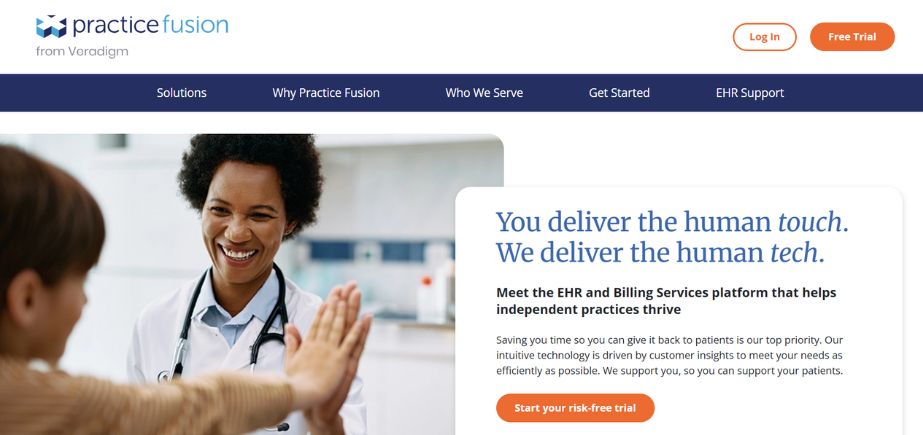
Rating: 3.9/5
Website: https://practicefusion.com/
Best Use Cases: Small independent practices seeking free solutions
Practice Fusion is an option that is different because it also allows use of a free EHR system with integrated billing features, which would be especially appealing to small practices on tight budgets. Automated claims processing functions and payment processing functions on the platform enable the platform to facilitate basic billing processes with easy-to-use interfaces that have minimal training requirements.
The integration feature with pharmacy computerized systems allows it to manage prescription billing, but in a simple form as compared to the high-end solutions. Customizable billing templates, DB, and practice fusion enable practices to configure their billing to their needs, whilst also ensuring a high level of professional presentation. The platform is a low-entry bar platform providing practices that are at the beginning of transitioning from a manual billing process to automated billing systems.
Key Features:
- Free EHR integration
- Automated claims processing
- Pharmacy software connectivity
- Customizable billing templates
- Basic payment processing
Pros:
- Free basic version
- Integrated EHR system
- Simple implementation process
Cons:
- Limited advanced features
- Basic support options
- Fewer customization capabilities
Pricing: Free
How to Choose the Right Medical Billing Software
When choosing the right medical billing software, it is important to consider a range of issues that will ensure alignment with the unique needs of your practice and also the operational requirements.
- Practice size: If you have a patient volume or a project today, and you think you can grow by the use of the software you are checking, consider that. And integration options.
- Budget Constraints: Consider both the initial cost and all of the future expenses, like training, support, updates, and other possibly hidden costs.
- Integration Need: Evaluate your existing technology including: EHRs, practice management systems and pharmacy management applications.
- Specialty Specific: Medical specialties vary in regards to billing requirements, complexity of their codes and rules.
- Support and Training: Evaluate the availability of customer support, training programmes and implementation support of vendors.
Conclusion
Selecting the medical billing software is a key decision that can have far-reaching effects on the effectiveness with which you run the practice and its impact on its financial success and regulatory compliance. The solutions we cover in this comprehensive guide work with a wide range of budgets, whether you have a small practice with modest needs or a large healthcare organization working on a single enterprise scale. The uses of each medical billing software solution are unmatched in the benefits that they offer, which may be through automation, integration, or specialized use in a particular type of practice.
Given close consideration of your practice, budget, specific requirements, and growth estimates, you can choose a medical billing software solution that can make your revenue cycle more streamlined, decrease administrative overhead, and make your practice successful to achieve further growth in the changing healthcare environment.
Frequently Asked Questions
Q: How much does medical billing software cost, on average, in small practices?
A: Medical billing software pricing. For Simple practice, some popular small practice software costs between 80-500 per provider monthly; the pricing can vary depending on the features, integration with other software, and level of support within the package.
Q: Can medical billing software be used with the EHRs currently in place?
A: Yes, the majority of the modern medical billing software solutions provide integration features with popular EHR systems so that you can get seamless data flows and integrated workflows throughout your practice management systems.
Q: What is the average time frame to use new medical billing software?
A: The implementation of practice size and complexity determines the time needed to implement. Most implementations of medical billing software require 2-8 weeks to implement completely, with data migration, training staff, and testing.
Q: Does cloud-based medical billing software utilize a secure and HIPAA-compliant system?
A: Trusted medical billing software providers apply effective security tools such as encryption, access controls, and frequent compliance audits to work with HIPAA compliance and save patient information.
Q: Do I have to get special training to apply medical billing software?
A: Medical billing software is typically developed to be easily Learnable; however, the majority of vendors offer training packages and maintenance resources to make sure your employees will cope with using the program and squeeze the maximum out of the functionality it requires.
 Get 50% off on Vault theme. Limited time offer!
Get 50% off on Vault theme. Limited time offer!